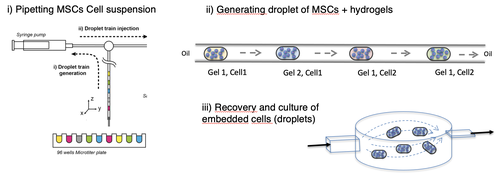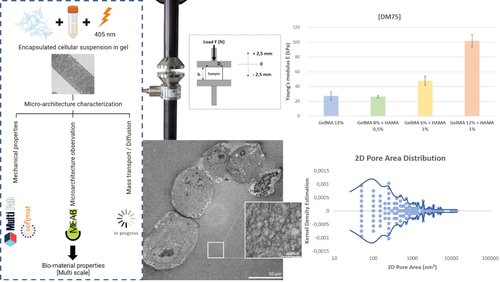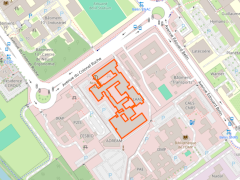Tissue Engineering
Engineering biomaterials and microenvironment for in-vitro tissues models and regenerative medicine
Cell and Spheroid encapsulation in hydrogel droplets
Research Engineer : Raphaëlle Paounov
Post-Doctoral researcher: Sandra Perez Dominguez
Associated Researchers: Laurent Malaquin, Daniel Ferri Angulo (TEAM), Julie Foncy ( I2C)

Hydrogels are viscoelastic materials commonly used as models for extracellular matrices in cell cultures. In our project, we focus on utilizing specific hydrogel materials, such as GelMA (Gelatin Methacrylate), as artificial matrices for tissue regeneration. GelMA is a chemically modified gelatin, functionalized with methacrylate groups to enable UV-induced crosslinking.
To optimize the development of viable cell tissues, it is essential to study the properties of hydrogels and their impact on cell behavior. Our project aims to develop an automated and standardized platform to assess the potential of mesenchymal stem cells (MSCs) in both suspension and spheroid forms within specific hydrogel matrices.
To achieve this, we employ droplet microfluidics to encapsulate cells and spheroids within hydrogel carriers. This platform will enable systematic screening of various hydrogel properties and their effects on cell behavior and function. Key parameters under investigation include hydrogel concentration, the degree of methacrylation, temperature, and gelatin chain length. Since eukaryotic cells are highly responsive to their surrounding microenvironment, these droplets will first be used to analyze spheroid behavior and subsequently serve as fundamental building blocks for tissue generation.
Collaborators: Louis Casteilla, Valérie Planat, Laurence Vaysse, Marion Cescato (Restore), Cell Easy
Publications:
M. Escudero, L. Vaysse, G. Eke, M. Peyrou, F. Villarroya, S. Bonnel, Y. Jeanson, L. Boyer, C. Vieu, B. Chaput, X. Yao, F. Deschaseaux, M. Parny, I. Raymond-Letron, C. Dani, A. Carrière, L. Malaquin, L. Casteilla, Scalable Generation of Pre-Vascularized and Functional Human Beige Adipose Organoids. Adv. Sci. 2023, 10, 2301499. https://doi.org/10.1002/advs.202301499
Studying Cell-Matrix co-evolution in adipose tissue regeneration
Post-Doctoral researcher: Sandra Perez Dominguez
Associated researchers : Laurent Malaquin
In tissue, cells are surrounded by a complex and heterogeneous matrix made of multiple components that are not easy to replicate in-vitro experiments. The employment of simplified matrices, like collagen and gelatine is becoming more popular as they provide a biocompatible and tuneable environment. In our case, we are focused on the use of methacrylated gelatine (GelMA), a photosensitive material that allows us to modulate its porosity and rigidity by playing with its concentration and UV exposure. In this project, we are interested in understanding how cell’s matrix properties influence cells behaviour, differentiation and proliferation. For that, we have developed a simple device that allow us to screen cells’ behaviour in contact with four different biomaterials, at the same time. Some other types of configurations are also under study. In collaboration with RESTORE, cells obtained from human stromal vascular fraction of white adipose tissue has been tested. This fraction is a source of adipose and endothelial progenitors, which are extremely precious for different purposes, such as tissue regeneration. When exposing a spheroid, composed of cells from the tissue previously mentioned, to distinct environments, differences in cell differentiation, organization and proliferation were seen. Therefore, this approach can serve to better understand cell-matrix interplay and decipher the best environment for a specific biological question.
Collaborators: Restore (Louis Casteilla, Laurence Vaysse, Marion Cescato)
Characterization of Bio-Material Microarchitecture for Long-Lasting Reeducation of Cell Behavior and Tissue Function in Age-Related Periodontal Disease
Research Engineer : Marwan Puaud
Doctoral researcher: Jeanne Minvielle
Supervision: Julie Foncy (I2C), Laurent Malaquin
Associated researchers : Daniel Ferri Angulo (TEAM)

This multidisciplinary study is the outcome of a collaboration between the ELIA team/I2C service and RESTORE. It investigates the relationship between the material properties of Gel-MA based Advanced Medicinal Therapeutic Products (AMTPs) and their ability to induce regenerative functions. The objective is to integrate multiple characterization techniques to comprehensively assess the impact of physicochemical parameters on key biomarker expression. Mechanical properties are evaluated through compression tests, while electronical microscopy is employed to examine 2D porosity and cell behavior within the hydrogel. Additionally, mass transport and diffusion analyses provide insights into the material's microarchitecture and its potential influence on regenerative processes.
Collaborations: RESTORE (Philippe Kemoun, Laurence Vaysse, Christophe Guissard) , SOFTMAT (Juliette Fitremann), CMEAB (Bruno Payre)
Funding : ANR PRISM
Studying Cell - Microenvironment co-evolution
Post-Doctoral researcher: Sandra Perez Dominguez
Supervision: Laurent Malaquin, Laurence Vaysse (Restore)
Description of the project













